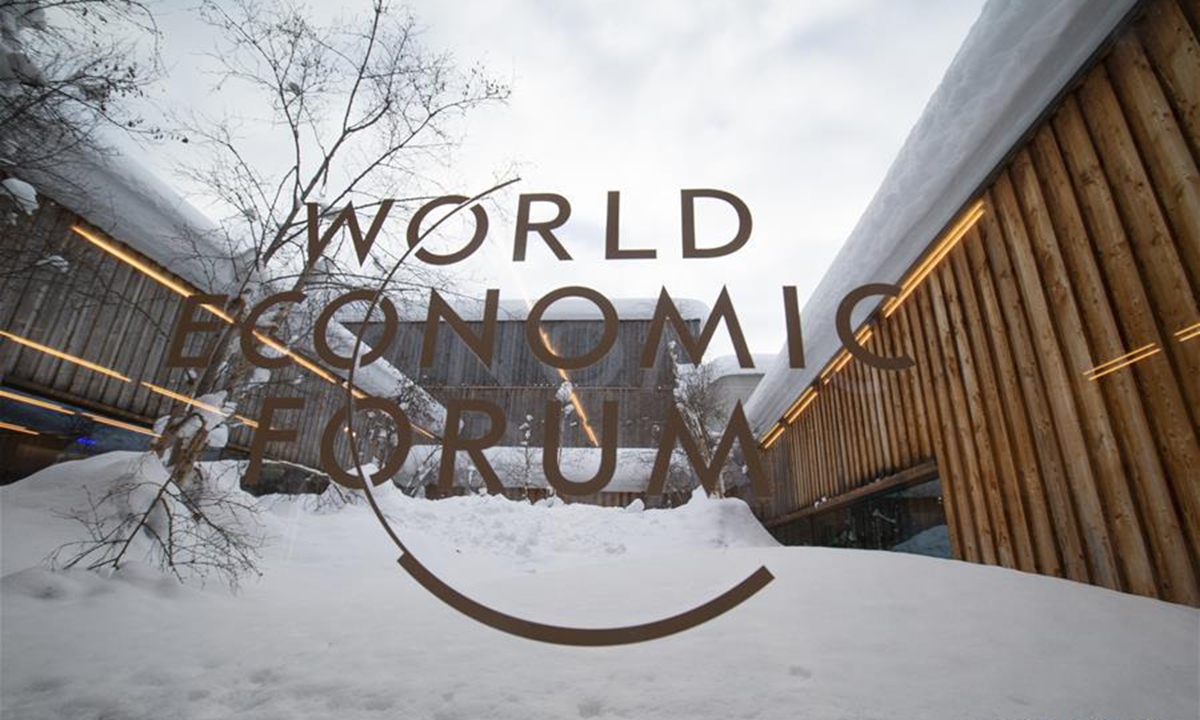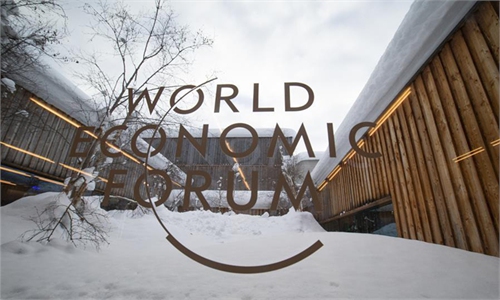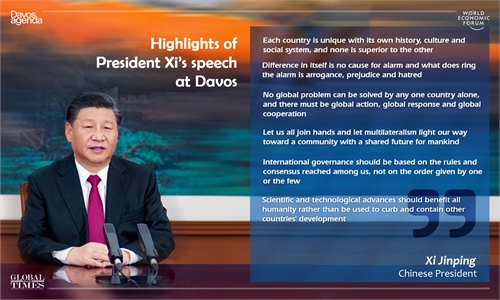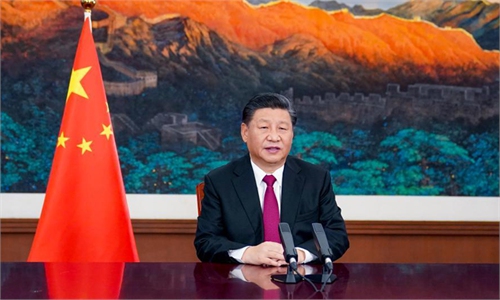Doubtful US will embrace real multilateralism

Photo taken on Jan. 21, 2019 shows the logo of the World Economic Forum (WEF) in Davos, Switzerland. The WEF Annual Meeting will kick off in Davos on Tuesday. (Xinhua/Xu Jinquan)
Editor's Note:Speaking via videoconference as he addressed the annual World Economic Forum on Monday, Chinese President Xi Jinping called for multilateralism to tackle the problems the world is facing. "To build small circles or start a new cold war, to reject, threaten or intimidate others, to willfully impose decoupling, supply disruption or sanctions, and to create isolation or estrangement will only push the world into division and even confrontation," Xi warned. This was widely interpreted by Western media as a "likely veiled attack on US President Joe Biden's plans to revitalize global alliances to counter China's growing influence." Why has China championed multilateralism? What true message does Xi send in his speech? The Global Times invited two scholars to share their views.
Gao Jian, secretary general of the Shanghai Academy of Global Governance and Area Studies at Shanghai International Studies University
China's advocacy for inclusive multilateralism is a judgment based on the current international political and economic situation. In President Xi's speech, he first talked about the unprecedented multiple crises in history brought by the raging COVID-19 pandemic, which has dealt a strong blow to human society and world economy. Its negative impacts on people's social life may continue to exist for an unknown period in the future.
In such a context, we must respond to challenges with an open and inclusive attitude. We must unite and join hands to tackle the pandemic and other major international affairs.
Some Western media outlets interpreted Xi's warning against "small circles" and "new cold war" as a "likely veiled attack" on the Biden administration. As a matter of fact, China issued the warning out of concerns for global challenges. Solving global problems needs true multilateralism, not multilateralism in a disguised form.
The Biden team's postures before and after it took office indicate that Washington is likely to return to multilateralism diplomacy. However, the multilateralism advocated by the US, as well as by some other Western countries such as the UK, is one among an alliance of "democratic countries." Such multilateralism in essence is exclusive. It's in fact a way to block the exchanges of human society, economics, culture, science and technology. It's not genuine multilateralism, but a repetition of the old-time Cold War ideology. Some Western countries, represented by the US, have never abandoned their Cold War and zero-game mentality. Multilateralism of "small circles" is not what the world needs.
Su Hao, founding director of the Center for Strategic and Peace Studies at the China Foreign Affairs University
Xi's address can be seen as targeted at the US to some degree. A string of de-globalization moves, such as withdrawals from several international organizations by the previous US administration, have affected the world and the US itself in multiple ways.
US' crackdown on China has sharply undermined China-US relations. With Joe Biden taking office several days ago, China certainly hopes that the new US government will learn lessons and avoid taking the destructive path the prior government took.
"'Selective multilateralism' should not be our option," Xi noted. The "selective multilateralism" can be seen as referring to US' approach toward multilateralism. In this sense, US multilateralism entails building small groups and setting up multilateral mechanisms with military and security; such as the Quadrilateral Security Dialogue with Japan, Australia and India. These mechanisms seek to confront and provoke certain countries. This demonstrates its Cold War mind-set, which is currently inconsistent with international relations trends.
Moreover, US multilateralism emphasizes the leading role of the US. By virtue of its dominance in international organizations, the US has imposed its will to replace the common will, exploiting them as tools to serve its interests. When multilateralism is in line with its interests, the US will take advantage of it. Otherwise, it will discard multilateralism altogether.
Such "selective multilateralism" has jeopardized the national security of many other countries and stability of the international community. Therefore, China firmly opposes it.
Commenting on Xi's speech on Monday, White House Press Secretary Jen Psaki said China threatens US' "influence in international organizations." This mirrors US' sour grapes mind-set when seeing China's claims gain approval from increasing numbers of countries. Washington feels its leading position in the international community has been impaired.
However, China does not intend to confront or compete with the US. Xi's statement and appeal mainly aim at promoting global development in a responsible way. On the international stage, it is expected that Washington will not deal with its ties with China with the sentiment of confrontation and competition. This will not be conductive to both countries and the international community.



